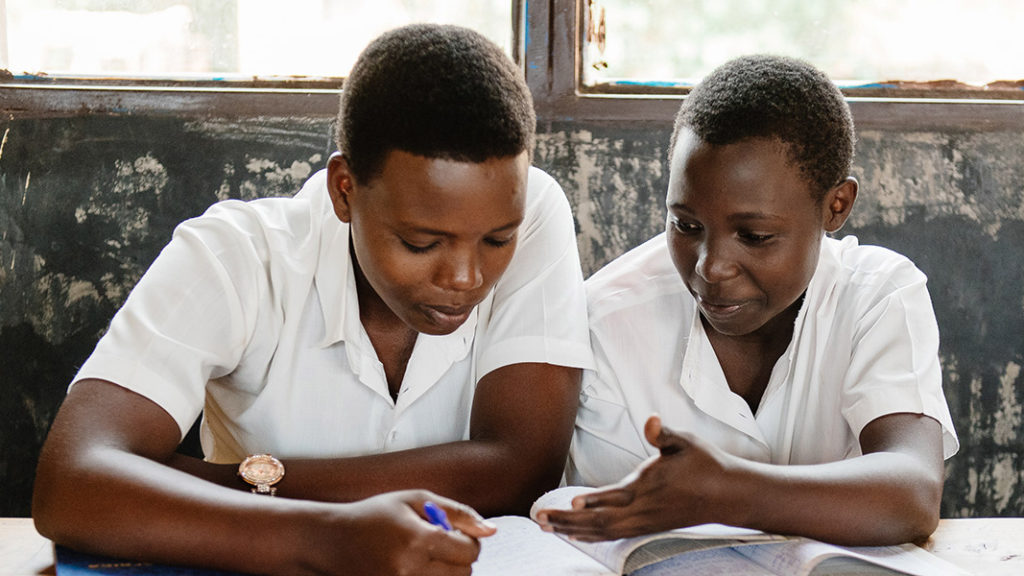In Rwanda, a work-readiness program is changing the way youth prepare for the future.
When he was young, Shema Claude dreamed of becoming an important lawyer. But growing up in Kigali, Rwanda, Claude saw many people just like him locked in a cycle of unemployment and poverty. It left a lasting — and discouraging — impression.
“I thought that only those people that came from rich families could find jobs,” he says.
This outlook impacted Claude’s studies. He attended school, but says he lacked motivation. He was convinced that he would never find any job, much less pursue his real dream of becoming an attorney.
But that outlook started to change during his second year at Senior Secondary School, where he took an entrepreneurship course that used EDC’s Work Ready Now! curriculum. Claude learned basic job-seeking skills, such as how to fill out a job application and write a resume. He also learned how to communicate with peers, resolve interpersonal conflicts, and manage finances — some of the soft skills needed for success in the workplace.
The course challenged many of his preconceptions about what was possible.
“I remember learning that there is no such thing as bad work,” he recalls. ”Having some work, no matter what it was, would give you the opportunity to improve your life. So I developed a new plan for my life. I would study as hard as I could and graduate with good grades and a secondary diploma, and then I would find work.”

Shema Claude tells his story at an Akazi Kanoze 2 event in October. Photo: Nadège Imbabazi
Skills for a Changing Economy
Rwanda is a country with an eye toward the future. It has made significant investments in infrastructure to support its economic growth and has a goal of becoming a middle-income country by 2020. Nowhere is this goal more evident than in Kigali, home to the many technology startups and innovation labs that are powering Rwanda’s transition to a knowledge-based economy.
But it’s also a young country — 40 percent of Rwandans are between the ages of 14 and 35 — and many of these young people need to find meaningful, productive work until the technology jobs of the future come online.
For nearly a decade, EDC’s Akazi Kanoze projects have been helping the Government of Rwanda improve opportunities for hundreds of thousands of young people who are coming of age during the country’s economic transition. Akazi Kanoze originally delivered livelihood and work-readiness trainings for out-of-school youth, but it was so successful that the program’s core approach — which included Work Ready Now! and partnerships with local employers — has been scaled up nationally, reaching over 92,000 high school and TVET students each year. (Akazi Kanoze was funded by the U.S. Agency for International Development from 2009 to 2016; funding for Akazi Kanoze 2, the current phase of the project, is provided by the Mastercard Foundation.)
The goal of Akazi Kanoze 2 is simple — facilitate a smooth school-to-work transition by teaching students entrepreneurship and workplace skills and giving them opportunities for work-based learning.

Young people enrolled in EDC’s Akazi Kanoze 2 program in Kigali, Rwanda. Photo: Paolo Patruno
“We encourage youth to set realistic goals and build on the strengths they have,” says EDC’s Tim Haskell, who has directed both projects. “Akazi Kanoze doesn’t just place youth into one opportunity — it gives them the skills they need to get the second, third, and fourth opportunities.”
A recent evaluation found that the approach is making a difference. Seventy-eight percent of students who participated in Akazi Kanoze 2 reported being comfortable developing a business plan, versus just over half of those students who did not take the program. Akazi Kanoze 2 participants were also more likely to set personal goals, communicate effectively, and exhibit higher levels of confidence than students who did not participate.
“Akazi Kanoze doesn’t just place youth into one opportunity—it gives them the skills they need to get the second, third, and fourth opportunities.”
–Tim Haskell
According to Haskell, support from the country’s Ministry of Education and Workforce Development Authority has been critical to the program’s success. He believes that the program came to Rwanda at just the right time.
“Rwanda is a case where it has all come together,” he says. “It has the political will to advance education, and it has enough businesses that can provide real employment and real work experiences for youth. The country is ripe for empowering and transferring work skills to young people.”
Planning for the Future
After graduating, Shema Claude eventually landed work as a custodian at a local pharmacy. It was not his ideal job, but it was work, and he dove into it.
“I was able to finish my work quickly each day — much faster than the others who didn’t know the benefit of working quickly,” he says. “In Akazi Kanoze 2, we had learned that if we did our work efficiently, that would please our bosses and open up the opportunity for them to give us other kinds of work.”
Impressed with his performance, Claude’s boss soon expanded his role, asking him to keep the shelves stocked with medicine, too. Over time, he became the pharmacy’s night security guard, then its courier, and eventually its accountant. And each time his role increased, his paycheck expanded.
Now, Claude earns more than four times what he did when he started as a custodian, and he’s able to save enough to revisit a long-held plan for his life.
Says Claude, “In January, I’ll start studying law at university, just like I’ve always dreamed of doing.”
This story originally appeared on EDC’s website here.




